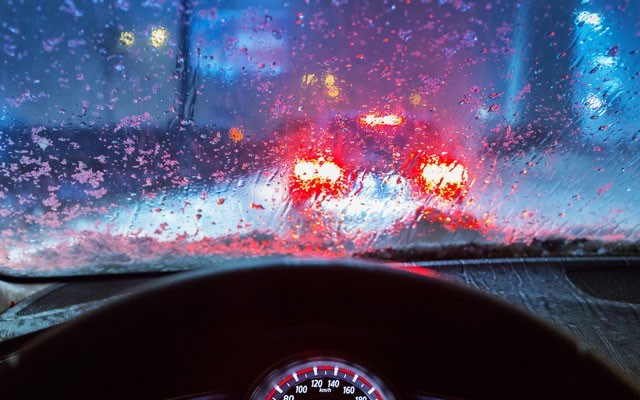It was raining in Los Angeles. Banshee droplets in mid-day darkness.
Aside from the fact that I'd hoped for a little sunshine over the two days I was about to spend there, traffic from the airport to Beverly Hills on the I-405 was hellishly slow for this time of day — even by L.A. standards. Which is probably why my cabbie felt the need to comment.
"Is raining," he began in an untraceable accent, pointing through the windshield as if I hadn't noticed and chuckling before he'd even delivered the punch line. "And now," he continued, "nobody know how to drive. Ha ha!"
He was right, of course. The freeway was clogged with people gripping their steering wheels and creeping along like Texans in a snowstorm. Most were clearly flummoxed by the sudden combination of splashing traffic and frantically beating wipers that combined to steal attention typically reserved for cell phones, cigarettes and radio-station roulette.
Rain is indeed a scarce commodity in Southern California, increasingly so in these days of climate-change-driven drought. When it does materialize, however, it's typically torrential — a bona fide meteorological event. The current liquid landscape reminded me of the mid-'90s years I'd lived in San Juan Capistrano, midway between L.A. and San Diego. Shortly after moving there from Toronto one April to work at a magazine, it had deluged. Having come from the spring downpours of Southern Ontario, this had hardly seemed important. But the mere fact of water falling from the sky had an interesting effect, drawing everyone in the office to the front windows, where they stared dumbfounded and mesmerized by the sudden interruption to the welcome but otherwise monotonous Orange County susnhine. It wasn't like it had never rained there before, or that it hadn't happened in this precise way. The milling crowd was more a demonstration of how the shortness of memory was inversely correlated with the length of time between even the most mundane occurrences: i.e., people here had no real connection to rain.
Not being a talker I usually discourage cab-ride conversations with curmudgeonly grunts, but this time I jumped right in. Now living on the B.C. coast I knew from rain. Boy did I know from rain.
"These folks wouldn't last five minutes where I live," I offered.
"Ah — where you fly from today?" asked the driver, on cue.
"Vancouver."
"Ah, yes. Big mountain. Much raining. Like my home, too — crazy rain."
"Oh, where's that — Japan, Korea, the Philippines?" I'd countered, assuming far too much from his appearance.
"Nepal." A faint glow of pride illuminated the cab's drab interior.
"Okay, so... monsoon?"
"Yes, yes. Is raining all the summer," he said, a statement of miserable fact that, if I correctly caught the subtext, seemed oddly tinted by sadness.
I looked out the heavily streaked window. Vehicles deliquesced around us; when we passed over another freeway, the cars below resembled tiny puddles of paint. I glanced back at the driver. Aside from whatever heartstring had momentarily drawn him taut, he seemed open and happy — a stitch in the great American tapestry; another castaway from the shipwreck of subcontinent poverty; afloat in a sea of sudden opportunity, yet able only to cling to the lowest-grade jetsam of the foundering S.S. American Dream.
I knew something of Nepal from a long-ago trek in the Annapurna region, however, and this fellow displayed none of the Hindu ethnicity of the lowlands or capital of Kathmandu, from where you would expect most immigrants to issue.
"What part of Nepal?"
"I grow up in small village at 3,000 metres... Everest region. Do you know?"
Indeed. Hill tribes. Sherpa most likely at that altitude. Which would explain some of his relaxed but stoic comportment.
"Yes, I do. And many Americans know that area, too. It's world famous. In fact, we romanticize endlessly about your country. I think we are obsessed with the people who go there to climb your mountains, but I think we also very much admire the people who live there... It must be a hard life."
A silence followed, neither awkward nor angry, but I could see his jaw set in the mirror, the sudden thin line of lips like a ruler. I wasn't sure what he was thinking, or if I'd offended him in some way, but now it was he who looked out the window. It was a gaze thrown far enough to absorb the anonymity of being but one car among thousands, each containing someone he didn't know, would never know; a gaze that registered being stuck in a traffic jam surrounded by people so detached from the land that they were unable to cope with its simplest phenomena. He cracked the window, happily breathing in the petrichor wafting from the heavily landscaped meridians of Beverly Hills.
"Life not so hard," he said finally, as the ruler sagged back into a smile. "Only missing it is hard. I lose rain, but now, look — rain finds me!"




